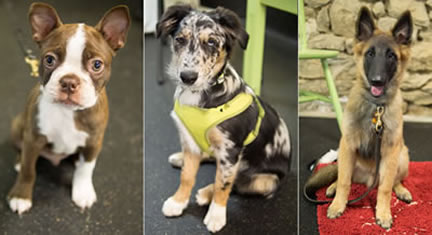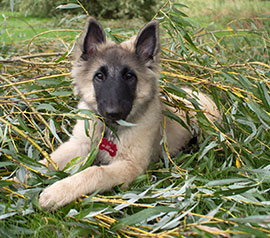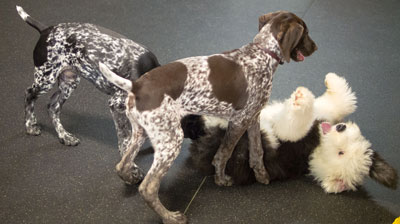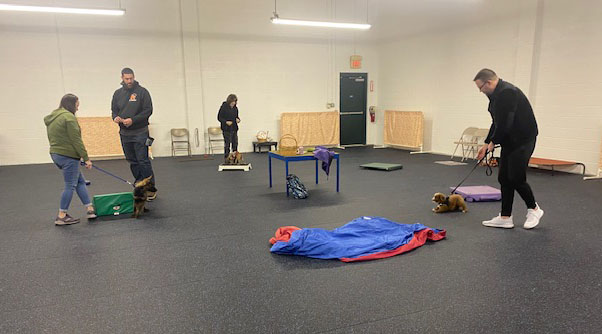CONGRATULATIONS ON YOUR NEW PUPPY!

Small or large breed, they don't stay puppies for long.
Get them into class before 16 weeks.
That little bundle of fur, paws and ears will be lots of fun, but he will also be sure to cause TONS of frustrations in the first few months. Here are some suggestions to help you make puppy's transition to his new home a little easier.
First, take a Puppy Manners and Socialization course in the first 9 - 16 weeks of your puppy's life. Click here to learn more.
Dogs are creatures of habit. For the most part, stick to a routine; it will be easier for puppy to know what's coming next. Good examples are feeding 3 times per day for the first few weeks, and then down to twice per day. Always take puppy out after sleeping, eating, playing, or when he gets excited (like when new people come to the door). Decide ahead of time what the house rules are (for example, will puppy be allowed in all rooms and on the furniture?) and ensure that all family members stick to them!
 Start right away with the process of crate training. Nearly all trainers agree that this is the single most efficient method of house training. ALWAYS have puppy associate the crate with good things, like treats and toys, and NEVER use it for punishment or show lots of emotion while putting puppy in or taking him out of the crate. The crate should be large enough to accommodate puppy when he is fully grown. This means that while he is a tiny puppy, part of the crate should be blocked off with a box or piece of plywood. The area should be large enough for puppy to stand up, turn around and lay down. Also, all sides but the front should be covered. This will provide puppy with a sense of security. A puppy can hold his bladder for a number of hours equivalent to his age in months. So for example, a 4 month old puppy can stay 4 hours in the crate before "needing to go".
Start right away with the process of crate training. Nearly all trainers agree that this is the single most efficient method of house training. ALWAYS have puppy associate the crate with good things, like treats and toys, and NEVER use it for punishment or show lots of emotion while putting puppy in or taking him out of the crate. The crate should be large enough to accommodate puppy when he is fully grown. This means that while he is a tiny puppy, part of the crate should be blocked off with a box or piece of plywood. The area should be large enough for puppy to stand up, turn around and lay down. Also, all sides but the front should be covered. This will provide puppy with a sense of security. A puppy can hold his bladder for a number of hours equivalent to his age in months. So for example, a 4 month old puppy can stay 4 hours in the crate before "needing to go".
Get your puppy a Kong. This is a hollow, hard rubber toy with a small hole in the top and a larger one in the bottom. It is shaped like a Michelin man; you can put small yummy treats in there and help your puppy figure out how to get them out. Once he figures this out, start placing the Kong in his crate, and teach him to associate "Kong" and "Crate", so he starts to really look forward to going in there for this special treat.
Do your best to avoid speaking to your puppy when you put him in the crate. Once you close the door, throw a few more yummies in there to help him associate that the crate is a great place. Then walk away without saying anything other than "see ya". When you open the crate to let him out later, simply open the door, pick him up and take him straight outside. Wait for him to pee/poo, and as he's standing up out of the squat position, click and treat or praise and treat. THEN you can have a party with him, make a big fuss, give him a rub-down or hug.

Helping your dog to learn how to play is one of the most
important you can do for him.
Here are my general rules for housetraining a puppy. This also applies to older puppies who are causing trouble with rambunctious behavior.
The puppy should be in his crate AT ALL TIMES unless one of the following SIX things are happening to him:
1. He is being walked
2. He is being fed
3. He is being trained
4. He is out in the fenced in yard or on a tie-out (or otherwise safely contained)
5. He is being actively played with (ball, tug)
6. He is tethered to you or to a table leg. The reason for this one is so that he can learn appropriate behavior while having some freedom. If he starts to sniff, pace, or circle, you know he's gotta go out, and you can avoid accidents! This also helps him to signal to you when he needs to go out.
In addition, he will start to learn appropriate behavior while in the house. For example, while you are siting down your puppy should be laying quietly at your feet, sleeping or chewing a bone.

Puppy classes usually have up to 6 puppies per class,
with lots of time devoted to socialization and play.
You will find that by the time your pup is finished doing all of these wonderful things several times per day, he's exhausted! Puppies need a lot of sleep! You also will be getting some piece of mind, knowing where he is while you are cooking dinner. This does not mean that you can't "just be with him"; feel free to hold him on your lap, but if he jumps off, he's in the crate, or tied to you, or you pick him up again.
Sure, your kids can take him out and play with him any time they want. But if they walk away from him for more than three seconds, it is your responsibility to take him out to relieve himself, and then back in his crate he goes with his toys, treats and Kong! (continued)
Click here to continue to Part 2
Learn about Spaying and Neutering

Small or large breed, they don't stay puppies for long.
Get them into class before 16 weeks.
That little bundle of fur, paws and ears will be lots of fun, but he will also be sure to cause TONS of frustrations in the first few months. Here are some suggestions to help you make puppy's transition to his new home a little easier.
First, take a Puppy Manners and Socialization course in the first 9 - 16 weeks of your puppy's life. Click here to learn more.
Dogs are creatures of habit. For the most part, stick to a routine; it will be easier for puppy to know what's coming next. Good examples are feeding 3 times per day for the first few weeks, and then down to twice per day. Always take puppy out after sleeping, eating, playing, or when he gets excited (like when new people come to the door). Decide ahead of time what the house rules are (for example, will puppy be allowed in all rooms and on the furniture?) and ensure that all family members stick to them!

Get your puppy a Kong. This is a hollow, hard rubber toy with a small hole in the top and a larger one in the bottom. It is shaped like a Michelin man; you can put small yummy treats in there and help your puppy figure out how to get them out. Once he figures this out, start placing the Kong in his crate, and teach him to associate "Kong" and "Crate", so he starts to really look forward to going in there for this special treat.
Do your best to avoid speaking to your puppy when you put him in the crate. Once you close the door, throw a few more yummies in there to help him associate that the crate is a great place. Then walk away without saying anything other than "see ya". When you open the crate to let him out later, simply open the door, pick him up and take him straight outside. Wait for him to pee/poo, and as he's standing up out of the squat position, click and treat or praise and treat. THEN you can have a party with him, make a big fuss, give him a rub-down or hug.

Helping your dog to learn how to play is one of the most
important you can do for him.
The puppy should be in his crate AT ALL TIMES unless one of the following SIX things are happening to him:
1. He is being walked
2. He is being fed
3. He is being trained
4. He is out in the fenced in yard or on a tie-out (or otherwise safely contained)
5. He is being actively played with (ball, tug)
6. He is tethered to you or to a table leg. The reason for this one is so that he can learn appropriate behavior while having some freedom. If he starts to sniff, pace, or circle, you know he's gotta go out, and you can avoid accidents! This also helps him to signal to you when he needs to go out.
In addition, he will start to learn appropriate behavior while in the house. For example, while you are siting down your puppy should be laying quietly at your feet, sleeping or chewing a bone.

Puppy classes usually have up to 6 puppies per class,
with lots of time devoted to socialization and play.
Sure, your kids can take him out and play with him any time they want. But if they walk away from him for more than three seconds, it is your responsibility to take him out to relieve himself, and then back in his crate he goes with his toys, treats and Kong! (continued)
Click here to continue to Part 2
Learn about Spaying and Neutering
Puppies!




